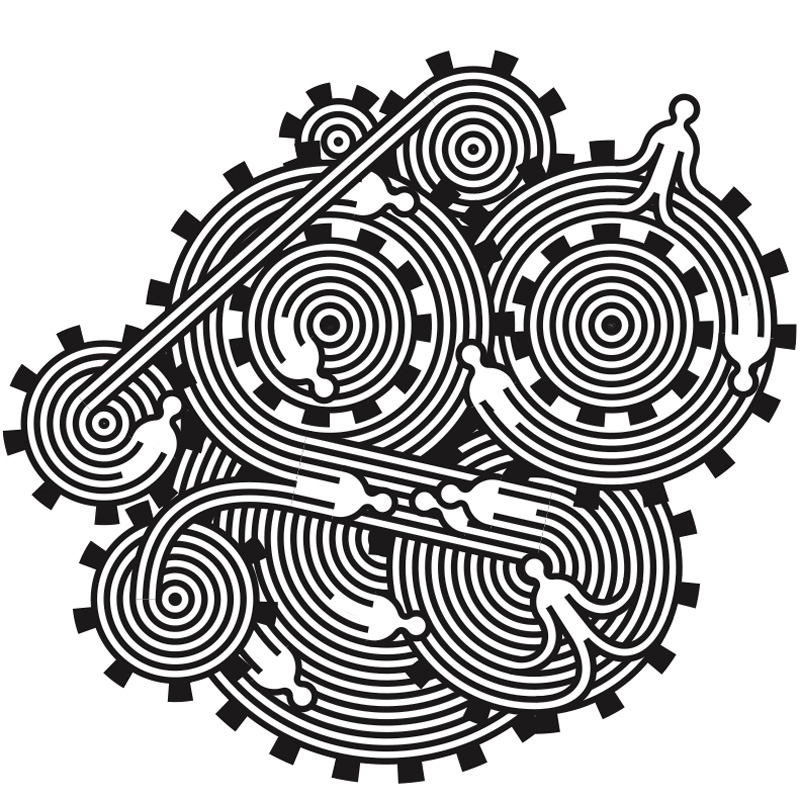Difference between revisions of "Holotopia: Power Structure insight"
m |
|||
| Line 7: | Line 7: | ||
[[File:System.jpeg]] | [[File:System.jpeg]] | ||
<p>We look at what remained ignored: the "systems in which we live and work" (which we'll here call simply <em>systems</em>). Think of those <em>systems</em> as gigantic mechanisms, comprising people and technology. Their purpose is to take everyone's daily work as input, and turn it into socially useful effects. </p> | <p>We look at what remained ignored: the "systems in which we live and work" (which we'll here call simply <em>systems</em>). Think of those <em>systems</em> as gigantic mechanisms, comprising people and technology. Their purpose is to take everyone's daily work as input, and turn it into socially useful effects. </p> | ||
| − | <p> If in spite | + | <p> If in spite the technology we are still as busy as were—should we not see if our <em>systems</em> might be wasting our time?</p> |
<p> And if the effect of our best efforts turns out to be problems rather than solutions—should we not check whether those <em>systems</em> might be causing us problems?</p> | <p> And if the effect of our best efforts turns out to be problems rather than solutions—should we not check whether those <em>systems</em> might be causing us problems?</p> | ||
</div> </div> | </div> </div> | ||
| Line 25: | Line 25: | ||
<div class="col-md-3"><h4>Federation</h4></div> | <div class="col-md-3"><h4>Federation</h4></div> | ||
<div class="col-md-7"> | <div class="col-md-7"> | ||
| + | <p> | ||
| + | Ferguson–McCandless–Fuller <em>thread</em> is here used ideographically. | ||
| + | </p> | ||
<p> | <p> | ||
Wiener | Wiener | ||
| Line 31: | Line 34: | ||
Jantsch | Jantsch | ||
</p> | </p> | ||
| − | |||
| − | |||
| − | |||
</div> </div> | </div> </div> | ||
Revision as of 11:50, 18 March 2020
Holotopia: The Power Structure insight
Scope
By developing the technology, our ancestors vastly augmented the effectiveness and efficiency of human work. Could a similar advent be in store for us today?
We look at what remained ignored: the "systems in which we live and work" (which we'll here call simply systems). Think of those systems as gigantic mechanisms, comprising people and technology. Their purpose is to take everyone's daily work as input, and turn it into socially useful effects.
If in spite the technology we are still as busy as were—should we not see if our systems might be wasting our time?
And if the effect of our best efforts turns out to be problems rather than solutions—should we not check whether those systems might be causing us problems?
Insight
Our systems tend to be conceived without any rational or conscious plan whatsoever.
The systems tend to evolve as 'cancer'.
We contemplated paraphrasing Bill Clinton's 1992 successful presidential campaign slogan, "The economy, stupid!", and calling this insight "The systems, stupid!". "The economy" (i.e. the economic growth) is not the solution to our problems—the economy is our problem... "The systems, stupid!" points to a winning political agenda in an informed society. Its consequences will be sweeping.
Federation
Ferguson–McCandless–Fuller thread is here used ideographically.
Wiener
Jantsch
Action
Systemic innovation—making the systems whole
- Back to Holotopia

